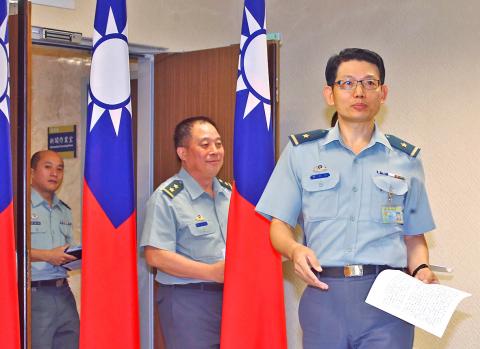The Ministry of National Defense late on Tuesday said its policy to phase out conscription and implement an all-volunteer military would be postponed again, as recruitment targets could not be met.
The plan to abolish the conscription system is to be pushed back at least to the end of next year, though it would still depend on the number of voluntary enlistments and other conditions at that time.
Critics and media called the postponement an embarrassing setback for President Ma Ying-jeou (馬英九); another “bounced check” among many promises Ma has made.

Photo: CNA
Establishing an all-volunteer military, consisting entirely of career soldiers, is considered one of Ma’s most important pledges and seen as an important test of fulfilling major government policies in his second term.
A total of 23,100 people, males aged 18 or over, would be affected by the postponement, according to the ministry’s announcement.
“Conscription is needed to cope with hostile threats from the enemy, escalating tensions in the region, the need for high combat readiness among the armed forces, and to effectively respond to disaster rescue and relief, and other emergencies,” the statement said.
According to officials, the ministry said Ma was informed of situation at a recent top-level military meeting, and the Cabinet approved the decision.
Ministry officials said compulsory military training is still in effect for males born after Jan. 1, 1994, who are still required to undergo four months of basic military training.
This is the second time that the ministry has pushed back its implementation of an all-volunteer military after not being able to meet its targets.
In September 2013, the ministry said the date would be pushed back two years because of recruitment difficulties and other situations among the branches of the armed forces.
In the original plan, the armed forces were scheduled to end compulsory military service for males born before Jan. 1, 1994, starting from Jan. 1 next year.
Tuesday’s statement marked an abrupt reversal, as the ministry announced just last month that shifting from conscription to an all-volunteer force was on track and it had reached 71 percent of its recruitment goal for the year, due to improved stipends and other incentives.
According to a high-ranking ministry official, as Taiwan is facing many “complicated circumstances and new challenges both internally and externally,” and as the situation is constantly changing, next year’s date could be pushed back again.
National conscription might even be kept, the official said.
“It will depend on adjusting to contingencies and new situations next year,” he added.
Presidential Office spokesperson Charles Chen (陳以信) said the military is on a “combined conscription and volunteer force,” and as such is not implementing an “all-volunteer force.”
“Due to false expectations, created when the term ‘all-volunteer force’ began to be used, it is not the case — as media reports have said — that this is a ‘bounced check on the all-volunteer force promise,’” Chen said.
“It was never the case,” he said.
Additional reporting by Wang Yu-chung

ACTION PLAN: Taiwan would expand procurement from the US and encourage more companies to invest in the US to deepen bilateral cooperation, Lai said The government would not impose reciprocal tariffs in retaliation against US levies, President William Lai (賴清德) said yesterday, as he announced five strategies to address the issue, including pledging to increase Taiwanese companies’ investments in the US. Lai has in the past few days met with administrative and national security officials, as well as representatives from various industries, to explore countermeasures after US President Donald Trump on Wednesday last week announced a 32 percent duty on Taiwanese imports. In a video released yesterday evening, Lai said that Taiwan would not retaliate against the US with higher tariffs and Taiwanese companies’ commitments to

‘SPECIAL CHANNEL’: Taipei’s most important tasks are to stabilize industries affected by Trump’s trade tariffs and keep negotiations with Washington open, a source said National Security Council Secretary-General Joseph Wu (吳釗燮) arrived in the US for talks with US President Donald Trump’s administration, a source familiar with the matter said on Friday. Wu was leading a delegation for a meeting known as the “special channel,” the Financial Times reported earlier. It marked Trump’s first use of the channel since returning to the White House on Jan. 20. Citing a source familiar with the matter, the Financial Times reported that Minister of Foreign Affairs Lin Chia-lung (林佳龍) was also a part of the delegation. The visit came days after China concluded war games around Taiwan and amid Trump’s

CHIP EXCEPTION: An official said that an exception for Taiwanese semiconductors would have a limited effect, as most are packaged in third nations before being sold The Executive Yuan yesterday decried US President Donald Trump’s 32 percent tariff on Taiwanese goods announced hours earlier as “unfair,” saying it would lodge a representation with Washington. The Cabinet in a statement described the pledged US tariffs, expected to take effect on Wednesday next week, as “deeply unreasonable” and “highly regrettable.” Cabinet spokeswoman Michelle Lee (李慧芝) said that the government would “lodge a solemn representation” with the US Trade Representative and continue negotiating with Washington to “ensure the interests of our nation and industries.” Trump at a news conference in Washington on Wednesday announced a 10 percent baseline tariff on most goods

Intelligence agents have recorded 510,000 instances of “controversial information” being spread online by the Chinese Communist Party (CCP) so far this year, the National Security Bureau (NSB) said in a report yesterday, as it warned of artificial intelligence (AI) being employed to generate destabilizing misinformation. The bureau submitted a written report to the Legislative Yuan in preparation for National Security Bureau Director-General Tsai Ming-yen’s (蔡明彥) appearance before the Foreign Affairs and National Defense Committee today. The CCP has been using cognitive warfare to divide Taiwanese society by commenting on controversial issues such as Taiwan Semiconductor Manufacturing Co’s (TSMC, 台積電) investments in the